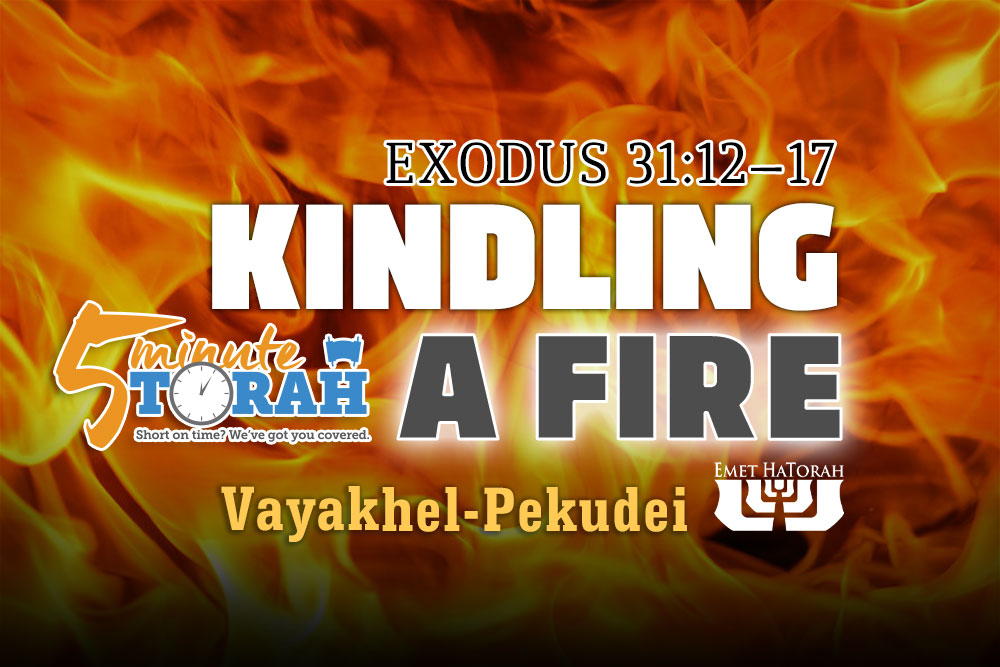Parashat Vayakhel-Pekudei (Exodus 35:1 - 40:38)
Series:

Kindling A Fire
In most years, Parashat Vayakhel and Parashat Pekudei are read together to conclude the book of Shemot (Exodus). When many people read these parashot, they seem to experience a sense of déjà vu. “Didn’t we read about this already?” they might ask. This is because these portions run nearly parallel to the earlier portions of Terumah and Tetzaveh, and even to Ki Tisa. Whereas the previous parashot detailed Hashem’s instruction to Moses about the preparations needed for the service of the Tabernacle, this week’s portion begins the process of Moses conveying this information to the Children of Israel and beginning the actual work. Therefore, there is a lot of overlap and repetition from previous portions in both Vayakhel and Pekudei.
One thing, however, is unique to Parashat Vayakhel. As we recall from Parashat Ki Tisa, Hashem gave Moses clear instructions that, although He was giving the Children the monumental task of constructing a Tabernacle for His Presence, none of the labors used in the construction of the Tabernacle was permitted to be done on Shabbat. However, our current parashah includes a detail about these prohibitions that we did not see in our previous parashah. At the beginning of our portion, Moses instructs the Children of Israel:
“You shall kindle no fire in all your dwelling places on the Sabbath day.” (Exodus 35:3)
When we read this, a question should immediately come to mind: Where did this instruction come from? It is not mentioned in Hashem’s previous instructions to Moses. It seems like Moses pulled it out of the air. Did he “add” to what Hashem had said? And to further complicate matters, of all the Sabbath restrictions detailed in Jewish law, this is the only one that is explicitly stated in the entire Torah. Why is this, and what can we learn from it?
First, we should remember that every word of the Torah is of Divine origin. That being the case, even if Moses did add the command to the instructions he received, it was under the direct inspiration of the Holy Spirit and therefore by the permission of Hashem. We should not consider this commandment to be outside the scope of being authoritative in any way. As we will see shortly, this commandment was already in place in some form several chapters earlier.
Next, we can learn at least two lessons from this commandment. The first lesson comes from the pashat, or face-value, interpretation. Kindling a fire on Shabbat is a serious offense, and it should be stated clearly that doing so will elicit a harsh punishment from the hands of Heaven. This prohibition includes using fire in any constructive manner, including cooking. This is why Moses previously told the Children of Israel, “Tomorrow is a day of solemn rest, a holy Sabbath to the Lord; bake what you will bake and boil what you will boil, and all that is left over lay aside to be kept till the morning” (Exodus 16:23). Since fire could not be used for cooking on Shabbat, all of the cooking had to be done ahead of time. This is still the rule today.
The second lesson we can learn comes from the darash, or homiletic, interpretation. Fire is frequently associated with anger, as it is written:
Therefore, when the LORD heard, he was full of wrath; a fire was kindled against Jacob; his anger rose against Israel. (Psalm 78:21)
As seen in this example, arousing one’s anger can homiletically be considered “kindling a fire.” The Sabbath is a time for shalom—peace, tranquility, wholeness. To arouse anger in oneself or in another person is not fitting for the Sabbath. Anger is not an appropriate response in most instances during the week anyway, so avoiding the arousal of this destructive force so as not to disrupt the sanctity of Shabbat is even more important. We always keep in mind that we should never act in a manner that would allow the flame of anger to be kindled on the holy day of Shabbat. By remembering this and putting it into practice, the Sabbath Queen will be welcome in our homes and the Light of Messiah will shine in our midst.








